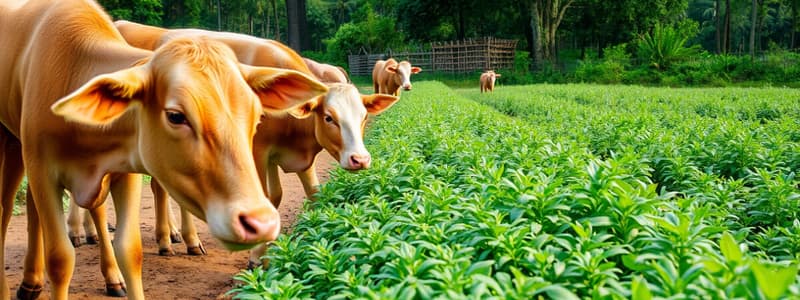Podcast
Questions and Answers
Animal-based food requires about five to fifty times more land and water resources than plant-based food.
Animal-based food requires about five to fifty times more land and water resources than plant-based food.
True (A)
Producing one kilogram of beef requires approximately 1,000 liters of water.
Producing one kilogram of beef requires approximately 1,000 liters of water.
False (B)
The majority of deforestation in the tropics is caused by the creation of farmland for livestock grazing.
The majority of deforestation in the tropics is caused by the creation of farmland for livestock grazing.
True (A)
Reducing garbage production by 10 percent can save 10,800 pounds of carbon dioxide per year.
Reducing garbage production by 10 percent can save 10,800 pounds of carbon dioxide per year.
The current system of animal protein production is deemed unsustainable.
The current system of animal protein production is deemed unsustainable.
Study Notes
Resource Inefficiency in Livestock Production
- Animal-based food requires 5 to 50 times more land and water than plant-based food, influenced by factors like animal species and feeding practices.
- The production of animal protein consumes 8 times more fossil fuel compared to plant protein.
Livestock Grain Consumption
- In the U.S., livestock consumes 5 times more grain than the entire human population, highlighting the inefficiency in feeding practices.
Water Use for Food Production
- Producing 1 kg of beef requires 100,000 liters of water, while only 900 liters are needed for wheat and 500 liters for potatoes.
Deforestation Impact
- Approximately 80% of tropical deforestation is due to creating farmland for livestock grazing and feed, as reported by a UN-sponsored workshop of 200 experts.
Sustainability Issues
- The current industrial system of animal production is deemed unsustainable, depleting fresh water and healthy soil at an unsustainable rate.
- Environmental consequences of this system include air pollution and the release of toxins.
Climate Change Contribution
- A tip sheet from ClimateCrisis.net indicates that reducing garbage by 10% can save 1,200 pounds of CO2 annually, but the remaining 90% still generates 10,800 pounds.
- Simply reducing activity levels without significant changes will not alleviate global warming effects, as CO2 emissions have long-lasting impacts on the atmosphere.
Urgency of Change
- Current measures, akin to sticking arms out of a speeding bus, are insufficient compared to the need for decisive action akin to driving the bus away from a cliff.
- The 2006 UN Food and Agricultural Organization report emphasized the correlation between animal agriculture and global warming, underlining the need for systemic changes in livestock operations worldwide.
Studying That Suits You
Use AI to generate personalized quizzes and flashcards to suit your learning preferences.
Description
This quiz delves into the impact of livestock production on environmental resources as documented by Dr. David Pimentel. It explores how animal-based food requires significantly more land and water compared to plant-based alternatives, highlighting the implications for global hunger. Test your understanding of these critical environmental issues and their relationship to food production.




